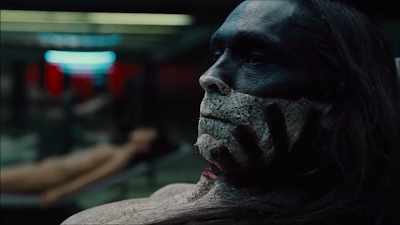Thus far, season 2 of Westworld has lived up to expectations, and then some. While not every subplot may have moved as seamlessly as the best, the technical elements have been consistently great and the recent few episodes have picked up the momentum on all fronts, throwing the viewer into crazy revelation after crazy revelation, thrilling interactions. The highlights being anything involving Young/Old William as the revelations surrounding him present him in an increasingly new light, Maeve's rather spellbinding ascension into higher 'wokeness', Dolores' initially somewhat dull turn into a callous killer that's been picking up some steam, Bernard's increasingly loopy travels back and forth in time (Jeffrey Wright, though taking something of a backseat, remains phenomenal as always).
As Westworld and its hosts and guests descend further and further down the chasm of chaos opened up by Robert Ford and Dolores last season, this last episode, 'Kiksuya', gives us something of a breather, so to speak. Some have called it a 'filler' episode, a term I don't think quite applies here. It's true that the exploration of Ghost Nation, the mysterious tribe of Native American hosts who have haunted the margins of the park across Seasons 1 and 2, capturing guests and for some mysterious reason setting them free, at first seems like it comes at a tangent to the other storylines this season. Yet as the episode progressed, and I became immersed into what in effect is a narrated visual backstory of Akecheta (Zahn McClarnon), I found not just narrative satisfaction, but something truly beautiful and moving within this astonishing hour of television.
SPOILERS AHEAD
Before Lawrence, before Maeve, before Bernard, before even Dolores, was the first truly 'woke' host, Akecheta. Written by Carly Wray & Dan Dietz and directed by Uta Briesewitz, this episode is possibly Westworld's ballsiest move yet. Led entirely by a respected but somewhat under-the-radar actor, featuring Lakotan characters and a Native American cast as its central focus, featuring only the briefest of appearances from the usual suspects, and repeatedly going over territory previously explored in the first season, this could have been a disaster if not executed well. Well far from it, this extraordinary episode only served to put everything that came before in an entirely different light. Not just the Native American hosts, but the park as a whole, and Ford's overarching plan finding another notch in it.
The highlight of the episode is of course, McClarnon's performance, which should sweep all the awards in his category come the Emmys. The focus granted to Akecheta's journey where he momentarily becomes the lead of Westworld, is one of great emotional potency and explores the host's place in the world in such a new light. I have so much respect for the show runners sticking to their guns on something that I'm sure must've caused studio executives to balk at first: an episode which such long extended stretches of silence, mostly spoken in a foreign tongue, resembling another Episode 8 from David Lynch's Twin Peaks: The Return. Like that episode, it is iconic from the very first frame. It is a great episode not just in conception, but in execution and influence.
In many ways it is a story about stories, as Akecheta tells his life story to Maeve's young daughter - though there's more to that, brilliantly revealed in the episode's finale. An inhabitant of the park before it even officially opened, Akecheta stumbles across the massacre of Wyatt and finds the symbol of the maze. I loved the construction of Akecheta's journey to sentience, where it begins as a deeply personal love story between himself and Kohana (Julia Jones), and progresses into an exploration of the wider world, the 'door' and its implications for not just himself, not just his people, but for all hosts and the abuse of their humanity. I loved the insight it gave into Akecheta even as he is modified into a violent killer, as we see the weight of his past memories continually return to him, and the brilliant inclusions of previous episodes like Logan's (Ben Barnes) return, the looming presence of the 'deathbringer' Dolores, and Anthony Hopkins' brilliant scene with AKecheta as Dr Ford and Akecheta discuss how to move forward into the Valley Beyond.
As expected for any Westworld episode, the cinematography is exceptional; those tracking shots of Akecheta prowling the landscape for his lost love are exceptional. And above all, the heartrending sequence of Akecheta in the Mesa. Set to a cover of Nirvana's 'Heart-Shaped Box', this sequence reminded me so much of Maeve's journey of discovery through the facility in Season 1 (set in that sequence to Radiohead's 'Motion Picture Soundtrack'). It is at once supremely moving and cathartic, a blend of perfect acting, and a brilliant way to fuse Akecheta's journey of self-discovery into his unique mode of saving the hosts, so different to Dolores.






Couldn't agree more, just a fantastic episode, while also being such a risk to sort of "stop" the narrative, yet wholly earning that through the greatness of its execution. Also whether it be in guest or supporting it would be hard to see a performance topping McClarnon's.
ReplyDeleteEasily the best episode of this season. The scene with the "Heart-Shaped Box" piano cover is amazing.
ReplyDelete